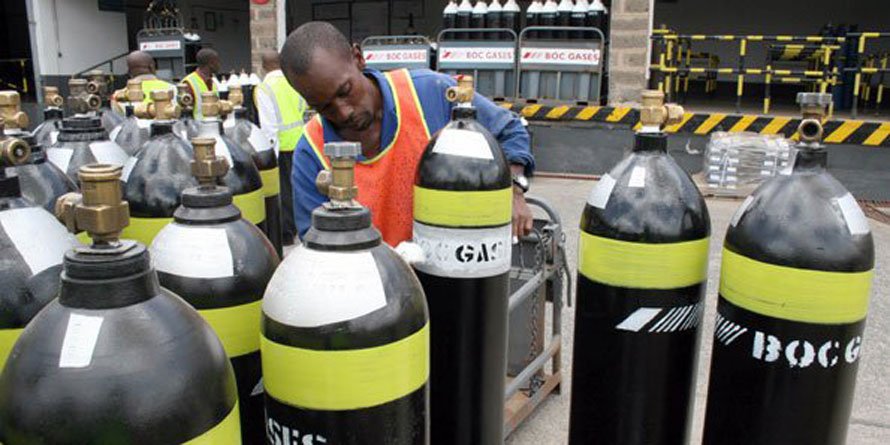A BOC worker prepares cylinders for refill at the company’s Industrial Area plant. FILE PHOTO | NMG The offer by Carbacid Investments Limited #ticker:CARB together with the Baloobhai family (through their vehicle Aksaya Limited) to acquire all outstanding shares of BOC Gases #ticker:BOC for a total cash consideration of Sh1.24 billion (about $11.3 million) represents a shift in the flow of capital.
Both Carbacid and BOC are the leading players in the industrial and medical gas market. BOC Kenya Plc’s ultimate majority shareholder is BOC Holdings of United Kingdom while Carbacid is a locally-domiciled company.
The buy-out, upon fruition, will create the largest industrial and medical gases producer in Kenya.
BOC, which has operated in Kenya since 1940, produces and supplies industrial, medical and special gases, while Carbacid, through its operating subsidiary Carbacid (CO2) Limited, is the leading producer of food-grade carbon dioxide.
Increasingly, both Carbacid and BOC’s businesses have come under pressure over the past decade, conceding market share to new entrants due to pricing pressures and changing market dynamics; which in turn triggered topline declines.
For instance, in 2009, BOC turned over Sh1.2 billion; which then dropped to under a billion in 2019.
The same trendline is observed with Carbacid whose turnover peaked at nearly a billion shillings in 2013, but dropped to Sh683 million in 2020.
This transaction could be some kind of a claw-back. But that notwithstanding, it is a unique transaction that has two major implications.
First, it is a form of indigenisation of brands by way of domestic capital acquiring foreign-domiciled assets. It is also noteworthy that BOC already had a 5.83 percent shareholding in Carbacid, which represented old ambitions to take the latter over.
Indeed, in 2009, BOC made a bid to acquire over 10 million shares in Carbacid, a transaction which would have elevated its shareholding to 94 percent, a transaction that eventually fell through.
You would expect that BOC would be in a better position, financial or otherwise, to buy-out Carbacid.But most importantly, it is a transaction that demonstrates a growing capacity of local businesses to indigenise foreign-domiciled market shares. Another similar transaction happened recently in August 2020 when PZ Cussons, a United Kingdom domiciled consumer products group, sold its Ushindi soap brand to Pwani Oil Products.Such transactions entrench domestic brands and deserve support in whatever way(s). Certainly the indigenisation pipeline is healthy and it is time domestic capital rose to the occasion (and there is also a great need […]
